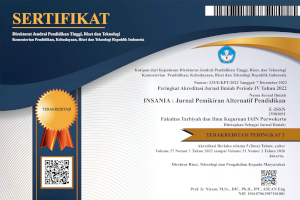PERAN PENDIDIKAN ISLAM DALAM MEMBENTUK KARAKTER SISWA DI ERA REVOLOSI INDUSTRI 4.0 DI MADRASAH TSANAWIYAH NEGERI 1 BANYUMAS
DOI:
https://doi.org/10.24090/insania.v24i2.3049Kata Kunci:
Role of Islamic Education, Character, Industrial Revolution 4.0 EraAbstrak
The role of Islamic education is a very strong foundation and becomes a reference of developing students’ character to face the Industrial Revolution 4.0 Era, and Islam is a source of truth and strength that can deliver ways on daily lives to achieve human character formation. Therefore, Islamic education is an important part of preparing the quality students. In other words, Islamic Education has a major contribution in the process of building students who have good character, have the ability to compete in the industrial revolution 4.0 era, have the ability to use global technology, and have the ability to adapt to the rapid development of technology. Islamic education is also expected to facilitate students to study hard consistently in order to face this era and students are expected to master sophisticated global technology without limits. This study aims to describe and analyze the role of Islamic Education in building students’ character in the Industrial Revolution 4.0 era. To achieve the purposes of the study, this study used a qualitative method with a qualitative-naturalistic approach. Various data collection techniques used in this study are observation, in-depth interviews, and documentation. The results shows that the role of Islamic Education in building students' character was carried out through the following activities; 1) Intra-curricular activities: in this activity, the teacher inserts characters in the teaching and learning process of all subjects namely Qu'ran hadith, Fiqh, History of Islamic Culture, Arabic, and Aqeedah Akhlak. The teacher connects directly with material of akhlaq or character 2) Extra-curricular activities include: Tilawatil Qur'an (reading the Qur'an) using digital literacy methods, Tahfidzul Qur'an (memorizing the Qur'an), Qitobha, Hadroh (Islamic Music) and Calligraphy. Through these two types of activities built several characters: religious, honest, fond of reading, responsible, independent, appreciating achievements, caring socially and hard work. By having the character, the students are ready to face the industrial era 4.0.Unduhan
Referensi
Enco. 2011. Menjadi Guru Profesional. Bandung: Remaja Rosdakarya.
Fanreza, Robie dan Pasaribu, Munawir. 2015. “Pendidikan Islam dalam Pembentukan Karakter Anak Didik dalam The Progressive and Fun Education Seminar, 978-602-361-045-7.
Iswan dan Herwina. 2018. “Membangun Sinergitas dalam Penguatan Pendidikan Karakter pada Era IR 4.0†yang diselenggarakan oleh Universitas Muhammadiyah Jakarta, Indonesia, 24 Maret 2018
Majid, Abdul dan Anggraini, Dian. 2011. Pendidikan Karakter Perspektif Islam. Bandung: PT Remaja Rosdakarya.
Megawangi, Ratna. 2004. Pendidikan Karakter Solusi yang Tepat untuk Membangun Bangsa. Jakarta: Star Energy.
Milles, M. B & Huberman, A. M. 2007. Analisis Data Kualitatif. Jakarta: Universitas Indonesia Press.
Moleong, Lexy J. 2009. Metode Penelitian Kualitatif. Bandung: RemajaRosdakarya.
Ningsih, T. 2014. “Implementasi Pendidikan karakter di SMP N 8 dan SMP N 9†dalam Disertasi. Yogyakarta: Universitas Negeri Yogyakarta.
Ningsih, T. 2015. Implementasi Pendidikan Karakter. Stain Press: Purwokerto.
Nur Hidayat, 2015. “Peran Dan Tantangan Pendidikan Agama Islam Di Era Global†dalam Jurnal eL-Tarbawi edisi Vol 8, No.2, 2015.
Pemerintah Republik Indonesia. 2010. Kebijakan Nasional, Pembangunan Karakter Bangsa 2010-2025.
Qomar, Mujamil. 2013. Strategi Pendidikan Islam. Jakarta: Erlangga.Mulyasa,
Rohman, Miftahur dan Hairudin. 2018. “Konsep Tujuan Pendidikan Islam Perspektif Nilai-Nilai Sosial Kultural†dalam jurnal Al-Tadzkiyyah: Jurnal Pendidikan Islam edisi Vol 9, No.1 2018.
Rosyadi, Slamet. Revolusi Industri 4.0 : Peluang dan Tantangan Bagi Alumni Universitas Terbuka dalam https://inet.detik.com/business/d-4041437/mengenal-konsep-revolusi-industri-40 diakses pada 5 Juli 2019.
Tilaar, H.A.R. 2009. Membenahi Pendidikan Nasional. Jakarta: Rineka Cipta.
Yahya, Muhammad. 2018. “Era Industri 4.0: Tantangan dan Peluang Perkembangan Pendidikan Kejuruan Indonesia†yang diseleggarakan oleh Fakultas Teknik Universitas Negeri Makassar, 14 Maret 2018.
Zuchdi. 2010. Pendidikan karakter dengan pendekatan komphrehensif terintegrasi dalam perkuliahan.
Unduhan
Diterbitkan
Cara Mengutip
Terbitan
Bagian
Lisensi
Authors who publish with this journal agree to the following terms:
Authors retain copyright and grant the journal right of first publication with the work simultaneously licensed under a Creative CommonsAttribution-ShareAlike License that allows others to share the work with an acknowledgment of the work's authorship and initial publication in this journal.
Authors are able to enter into separate, additional contractual arrangements for the non-exclusive distribution of the journal's published version of the work (e.g., post it to an institutional repository or publish it in a book), with an acknowledgment of its initial publication in this journal.
Authors are permitted and encouraged to post their work online (e.g., in institutional repositories or on their website) prior to and during the submission process, as it can lead to productive exchanges, as well as earlier and greater citation of published work (See The Effect of Open Access).








